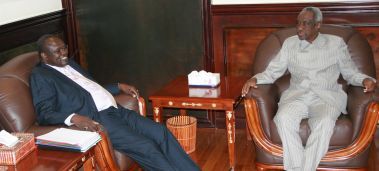Sudan’s peace partners meet to defuse looming political crisis
By James Gatdet Dak
November 1, 2009 (JUBA) – The two partners to the Comprehensive Peace Agreement are at the verge of political crisis following the Saturday’s decision by the SPLM ministers to join their assembly members by boycotting participation in the cabinet meetings in Khartoum.
 The party members in the National Assembly for the last two weeks have boycotted parliamentary sessions.
The party members in the National Assembly for the last two weeks have boycotted parliamentary sessions.
The SPLM demands that draft bills for the conduct of referenda in the South and Abyei, popular consultations for Nuba Mountains and Southern Blue Nile as well as bills such as that of national security needed for democratic transformation and conduct of free and fair elections should appear in the schedule of parliamentary sessions in order to participate in the deliberations.
The National Congress Party (NCP) has also angrily reacted to the Saturday’s statement in Juba by the SPLM’s Chairperson, First Vice President of Sudan and President of the semi-autonomous Southern Sudan, General Salva Kiir Mayardit, which stated that voting for unity of Sudan by Southern Sudanese would be like voting for second class citizenship in the country.
NCP officials say such a statement will have to be discussed at the joint committee level as well as at the level of the Presidency.
The SPLM’s Deputy Chairperson and Vice President of the Government of Southern Sudan, Dr. Riek Machar Teny was dispatched to Khartoum on Saturday to try to calm the situation.
The two parties are expected to discuss the issues that led to the SPLM boycotting both the parliamentary sessions as well as cabinet meetings.
It is not clear whether or not Salva Kiir’s statement will be on the agenda for discussion.
The two parties are also expected to discuss and try to resolve on the remaining outstanding bills so that they can be presented to the cabinet and assembly for approval before the lawmakers go on final recess.
The National Assembly has only one month left before it finally closes and dissolves until an elected parliament comes in after April 2010 elections.
(ST)
